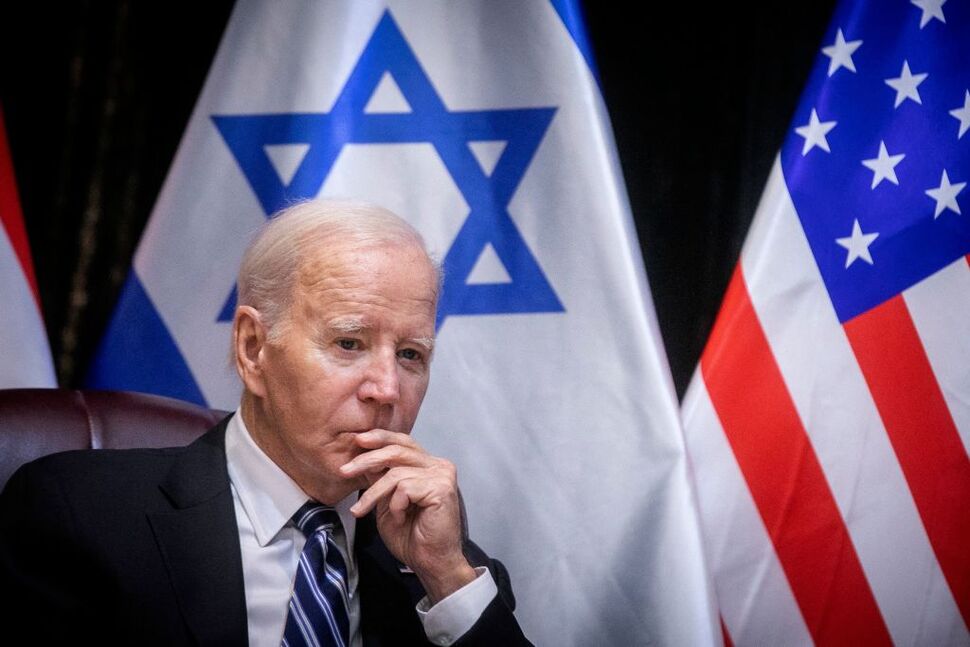President Joe Biden is taking his most decisive step yet to leverage U.S. military support for Israel into a greater say over that country’s devastating war against Hamas. But despite being well-received by young Democrats and progressives who see it as overdue, the move could prove costly if it risks alienating the powerful pro-Israel wing of his party six months from Election Day.
Biden on Wednesday said he had halted a shipment of particularly destructive offensive weapons that included 1,800 2,000-pound bombs and 1,700 500-pound bombs. The administration said it is also reviewing whether it will press pause on future transfers. The move comes as Israel appears poised to escalate its offensive on the southern Gaza city of Rafah, believed to be the last Hamas stronghold in the Gaza Strip but where an estimated 1 million displaced Palestinians have taken refuge.
The announcement marked the president’s boldest step yet to rein in Israel’s onslaught since Hamas’ Oct. 7 surprise attack. Even in statements in which he has been critical of Israel’s conduct in the war, Biden has walked a fine line politically by always stressing his commitment to its security. Similarly, his support for Israel is routinely qualified with concerns for the humanitarian needs of Palestinians in Gaza. Yet the approach has been derided by the progressive, pro-Palestinian wing of his party and the young Democratic voters and students across the country who have been protesting on college campuses – factions that Biden has struggled to energize in his reelection campaign.
Brett Bruen, the former director of global engagement at the White House and a diplomat who now runs the strategic consulting firm Global Situation Room, sees Biden as “being stuck between a rock and a hard place.”
War in Israel and Gaza

While a recent POLITICO-Morning Consult poll found that 33% of Democratic voters felt that Biden wasn’t being tough enough on Israel,” it also found that 42% said his approach was “just right,” showing that he faces risks in altering course.
Indeed, some moderate Democrats for whom support for Israel is inviolate are bristling at Biden’s more aggressive posture.
“As the leader of the free world, America cannot claim that its commitment to Israel is ‘iron-clad’ and then proceed to withhold aid from Israel,” wrote Democratic Rep. Ritchie Torres of New York, adding that the “mixed messaging makes a mockery of our credibility as an ally. No one will take our word seriously.”
Bruen says pledging unwavering support only to then place conditions on it risks the appearance of making decisions based upon “whichever direction the political winds are shifting.”
“We want to have learned the lesson by now that you cannot have your diplomatic cake and eat it too. When it comes to these major crises, you have to pick a course.”
It’s an issue that Republicans are also sure to raise during the presidential campaign.
House Speaker Mike Johnson and Senate Minority Leader Mitch McConnell sent a letter to Biden expressing alarm, saying the decision calls “into question your pledge that your commitment to Israel’s security will remain ironclad.”
Khaled Elgindy, senior fellow and director of the Program on Palestine and Palestinian-Israeli Affairs at the Middle East Institute, predicted that, as the tension continues to grow over the decision, the U.S. is likely headed for a showdown between Biden and Prime Minister Benjamin Netanyahu. He suggests Netanyahu – who has shown little inclination to back down from his plans for a ground incursion in Rafah – might try to test the limits of the administration.Netanyahu warned Thursday in a video on social media that Israel was strong enough to fight alone.
“If we have to stand alone, we will stand alone,” he said.
Importantly, though, the White House has presented its decision to hold back some offensive weapons not as an order but instead as a choice. National Security Council spokesman John Kirby on Thursday said Israel has to make “a choice” on whether it will “smash” into Rafah and trigger a decision from the U.S. to withhold additional weapons shipments.
“We’re going to be watching what the Israelis do here, what their decision-making looks like going forward,” Kirby said. Biden told CNN on Wednesday that Israel has used the 2,000-pound bombs – the type included in the arms shipment that was paused – to kill Palestinian civilians. U.S. officials have urged Israel to offer a plan to safeguard civilians before heightening its operations.
Also notably, Biden in his latest remarks said the U.S. would continue to provide defensive weapons that guard against incoming missiles and rockets.
Elgindy underscores the importance of the administration making the distinction in the types of weapons being withheld, saying it gives them the ability to argue they are not abandoning Israel’s security. He says that as long as the issue remains a partisan divide, Biden will be able to weather the storm, adding that as long as his party is unified behind him, “he can withstand a Republican onslaught, which will just be rhetorical.”
On the other hand, Bruen says that Biden has played the cards he had poorly and that he is now in a lose-lose situation “where it is hard to see how, whether it’s the electorate or within his own party, he comes out of this with anything other than a disastrous result.”



